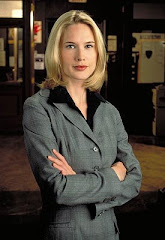This first episode of Law and Order established character plots, the general storyline for the plots and tied the new cast to the older one (with Abby Carmicheal making a short appearance.) Due to the premiere context of this episode, a lot of the script and actions seemed a little forced and full of inuendo. I agree with several of the other bloggers that this created some offensive moments, especially with regard to assumptions about sexual identity, victim blaming in sexual violence crimes, and the implied idea that female cops are not as mentally resilient as their male counterparts. Thankfully, most of these issues are toned down as the seasons progress, especially where Olivia is concerned. Later she takes on serial stalkers face-to-face and does not allow her personal life to interfere with any suspects, even when their crimes hit close to home.A small pet peeve that grated on me in this show were the quips from Detective Munch. I know that his character is supposed to be a little abrasive and full of dry humor, but it was a little over the top in this episode. He was honestly quite annoying! As with Olivia's character, Munch is toned down and even finds a heart later in the evolution of the show, especially with regard to the deaf doctor who he interacts with in later episodes.
I was quite struck in watching this episode with Dr. Shaw's question about who recieves justice in the Law and Order episodes. Although I don't feel that the show tries to favor the rich or any other population in its plotlines, it does strive to show the reality of the system, which is that different people recieve different levels of defense and treatment in trials. The system is very biased against the poor, in terms of bail and defense lawyers. A rich person can await trial at home while out on bail, as well as afford a cadre of the best lawyers possible. However, the poor are forced to stay in jail because they cannot afford to raise bail and are assigned public defenders who are often overworked, as many public employees are. There shouldn't be this discrepency in our justice system for the very reason that it is not justice at all. It is favoritism for the elite. Money should not act as a factor in the judicial process, which is sadly often the case often is (think of O.J. Simpson.) However, Law and Order does a good job in some epsiodes of stealing the smug smiles of the faces of those who thought they had bought there way out of a conviction when the jury returns a guilty verdict and a jail sentence is handed down. The system does work, but perhaps not as equally as we would like to think. Beyond class diferences, the judicial system also has bias as far as race, gender, and ethnicity are concerned, which is a little disquieting in a country that prides itself on equality for all. It is an ever-present demon that must be constantly faced by judicial professionals and concerned citizens.
This question of justice also spurred thought with this episode due to the idea that "we can't pick the vic," as Cragen says. The murder victim is truly a monster in his actions in the ethnic cleansing that occured in Kosovo in the nineties, yet he was also a family man who had a loving wife and child. The murderers, people we are supposed to think of as "bad," are businesswomen who endured terrible conditions and are trying to heal. Where is their justice? What is the role of international courts to bring those accused of war crimes to trial in a timely manner? Was the victim truly evil? Is anyone truly evil, or all-bad? These are rhetorical questions that lend theselves to philisophical discussions, but the role of women does appear in them. The rape victims go to jail for killing their rapists, which no one feels good about, but that is justice according to our system. Whereas I don't think that a murderer should get off free, I don't envy prosecuters the headaches they must get when grappling with these gray areas of our justice system.
Subscribe to:
Post Comments (Atom)
















2 comments:
Well said! I agree with your points about the justice system. I enjoy seeing the satisfaction that the detectives have when they are able to lock up someone of high social status. Mainly because the perpetrator is often smug and thinks she/he is "above the law". See you Monday!
I definitely agree about what you said about who receives justice. Throughout the season although concern is shown for the homeless and the poor when they are involved, there are quite a few times when a witness is someone with mental health issues or is living on the street and that is thrown out as not useful as far as conviction goes because they are not an accountable witness in the jury's eyes. Its unfortunate that a nice suit and clean haircut earn respect and a sense of morals, even among the amount of corrupt people that have been exposed in recent years who are well recognized as upper class. It really is a strange world...
Post a Comment